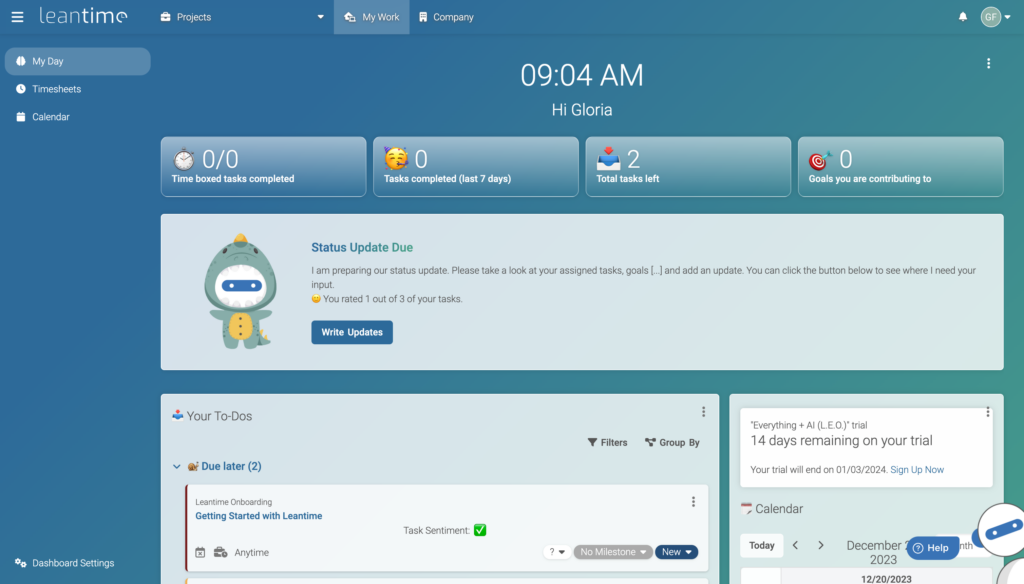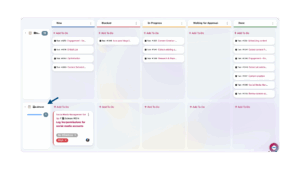Estimated reading time: 11 minutes
Feedback plays a crucial role in fostering growth and improvement in the workplace. It’s one of the main ways that we can know and understand when to make changes or when we’re hitting the mark. In the workplace, though, individuals with ADHD (Attention Decifit Hyperactivity Disorder) often face unique challenges when it comes to responding to feedback.
One such challenge is Rejection Sensitivity Dysphoria (RSD), a condition characterized by intense emotional responses to perceived rejection. This can be particularly challenging during feedback and peer performance review periods and can significantly impact work performance.
Table of contents
- What is Rejection Sensitivity Dysphoria?
- Why Feedback Can Trigger RSD
- RSD and the ADHD Brain
- Tips for Giving Feedback to Employees with ADHD
- Managing RSD Reactions at Work
- Should You Communicate Your Needs to Your Manager?
- Seeking Support at Work for RSD
- Leantime: A Work Management Tool Built with ADHD in Mind
- Empower Your ADHD Journey
What is Rejection Sensitivity Dysphoria?
Rejection Sensitivity Dysphoria is a condition characterized by extreme emotional sensitivity to perceived rejection. It is particularly common in people with ADHD. RSD can manifest as intense feelings of distress, anxiety, extreme sadness, or even anger when an individual perceives that they have been rejected or criticized, whether or not the perceived rejection is real or imagined.
Statistic: An estimated 99% of individuals with ADHD experience Rejection Sensitive Dysphoria (RSD) at some point in their lives.
There is not enough research to make it clear why RSD is something that impacts people with ADHD but the thought is that it relates to the emotional dysregulation typical of the condition. It is not a formal component of diagnosis or listed as part of the DSM at this time. It is, however, something well-known and experienced by many with ADHD.
Why Feedback Can Trigger RSD
Feedback at work can often trigger Rejection Sensitivity Dysphoria (RSD) in individuals with ADHD due to several factors. One primary reason is that feedback can be seen as criticism, even when it is intended to be constructive. People with RSD may perceive negative feedback as a personal attack, causing them to feel an overwhelming sense of shame, anxiety, or anger.
RSD Often Starts in Childhood
This is rooted in the impact of earlier events setting the tone and conditioning these negative emotions and reactions. This rejection, so to speak, by people we perceive should accept us and love us as we are, sets a strong tone as we grow into adulthood.
To be clear, rejection sensitivity dysphoria should not be confused with the experience of “walking on eggshells” but rather is an emotional experience, something that may occur regardless of the presentation of the feedback.
Many of us have experienced negative treatment of things that are normal to us but not often normal to the “outside world.” Examples of this include the child who can’t focus at school and gets called lazy their entire lives, being told statements like “if only you applied yourself more,” while they are working so much harder to cross the same distance others have.
In situations like this, it can make us even more sensitive to types of feedback in these areas and can even shape our behavior to avoid this type of feedback. I over-explain things now so that I don’t get perceived incorrectly. As a result, it takes me a long time to send emails as I think and overthink every sentence.
Someone who was told they were lazy may have decided to lean into that in school and take that on (quitting doing hard things) and others may have spent time working 10x harder to prove everyone wrong. For someone like this, feedback around how hard they’ve worked (or didn’t) may create a larger emotional response than expected.
Fear of failure or not meeting expectations can exacerbate RSD reactions to feedback. Individuals with ADHD might be acutely aware of their challenges and difficulties, making them more susceptible to RSD as they may feel that any negative feedback confirms their perceived inadequacies.
Understanding the impact of feedback on individuals with RSD can help both employees and managers navigate the complexities of workplace communication and foster a more supportive environment for those with ADHD. This requires creating a psychologically safe work environment.
RSD and the ADHD Brain
Rejection Sensitivity Dysphoria (RSD) and ADHD share a strong connection, as the ADHD brain structure experiences unique challenges that may contribute to the development and exacerbation of RSD. Closely linked, emotional dysregulation, RSD and executive function challenges often go together.
Emotional Dysregulation
Emotional dysregulation is a common symptom of ADHD, which refers to difficulties in managing and expressing emotions. Emotions may come quickly, strongly, and with little time to control reactions. When individuals with ADHD receive feedback, they may experience intense emotional reactions, making it difficult for them to respond calmly. This heightened emotional state can further trigger RSD, as the individual may perceive even the slightest criticism as a personal attack or rejection.
Executive Function Challenges
ADHD is also associated with executive functioning challenges, involving cognitive processes such as planning, organizing, and regulating behavior. These challenges can make it harder to adapt to traditional workflows and contribute to feelings of inadequacy and rejection, intensifying RSD symptoms.
There is often a stigma around these types of challenges in the workplace and in school — compounded by a lack of supporting resources. Fitting in with a system that does not adequately support your differences can worsen this sense of, “why can’t I just do the thing everyone else is doing?”
Growing up, I had a feeling of “why do all these things come so easily for everyone else and not for me?” This outsider feeling can intensify RSD symptoms when feedback can be perceived as “being found out” and proof that one does live on the outskirts of the rest of the world, team, or organization.
Understanding the relationship between RSD and the ADHD brain can help both employees and employers develop strategies to manage RSD at work and create a more supportive environment for individuals with ADHD.
Tips for Giving Feedback to Employees with ADHD

It’s crucial to be considerate and mindful when providing feedback to employees and even more so with ADHD, as they may be more prone to experiencing Rejection Sensitivity Dysphoria (RSD). Here are some tips to ensure that feedback is both helpful and supportive:
Focus on Strengths and Opportunities
Focus on strengths and growth opportunities: When giving feedback, emphasize the employee’s strengths and areas for improvement rather than dwelling on their shortcomings. This approach can help build confidence and motivation while mitigating the potential impact of RSD.
Give Factual Feedback, Omitting Emotional Language
Giving concrete examples using factual language can give employees the ability to be actionable. Oftentimes, feedback is given in generalities and vague expressions that leaves someone feeling confused.
By being intentional with examples that have occurred and with examples of ways to improve, employees can more easily separate themselves emotionally from the feedback and have something they can now make changes to implement.
Ask How They Want to Receive Feedback
Ask how they prefer to receive feedback: Everyone has unique preferences when it comes to receiving feedback. Asking employees with ADHD how they would like to receive feedback can help create a more comfortable and supportive environment. This consideration can also alleviate some of the anxiety and stress that may arise from RSD.
Follow Up the Feedback in Writing
Follow up in writing: Providing written feedback can effectively ensure that employees with ADHD fully understand and process the information. This approach allows them to revisit the feedback at their own pace and absorb the information in a way that best suits their needs, helping minimize RSD’s impact.
Managing RSD Reactions at Work
Effectively managing Rejection Sensitivity Dysphoria (RSD) reactions at work can significantly improve an individual’s overall work experience and performance. Here are some strategies that can help employees with ADHD and RSD to cope with feedback and maintain a healthy perspective:
Take Time to Process
Take time to process the feedback: When receiving feedback, it’s essential for individuals with RSD to give themselves the necessary time to process the information. Instead of reacting immediately, take a step back, reflect on the feedback, and consider its relevance and implications. This approach can help mitigate RSD’s emotional impact and allow for a more constructive response.
Remind Yourself that Criticism Isn’t a Character Judgment
Remember criticism isn’t a character judgment: One crucial aspect of managing RSD is recognizing that criticism, even if it’s constructive, does not define one’s worth or character. Understanding that feedback is meant to help improve performance and growth rather than to attack one’s personal qualities can go a long way in alleviating the intense emotional pain and burden of RSD.
Create a Safe Place
Even if you mentally know that the feedback isn’t intended to be hurtful, it’s still important to feel the feelings that come up for you when you receive it. Whether the feelings are shock, hurt, sad, or otherwise, it’s important to acknowledge the feelings and then give yourself time to manage them before attempting to solve them.
Should You Communicate Your Needs to Your Manager?
Did you know: Only 3% of employees disclose their disabilities to their employer.
Pop into any adhd familiar group on Reddit, and the answer you’ll hear is “Don’t do it.” for the folks that do it, 50% of them have been known to regret it, according to a study done by the University of London.
If you have a work environment where you can be supported, it’s important to communicate your needs effectively to your manager. This open communication can help create a more supportive and understanding workplace environment.
Start by explaining how RSD impacts you, both emotionally and professionally. Describe the challenges you face when receiving feedback and how the symptoms of RSD can interfere with your work performance. This explanation will help your manager better understand your unique struggles and allow them to provide appropriate support.
Next, request a specific feedback delivery method that works best for you. Depending on your preferences and comfort level, this might include written feedback, one-on-one meetings, or even group discussions. By being proactive and expressing your needs, you can work together with your manager to create an environment that supports your growth and minimizes the impact of RSD on your work experience.
If you cannot do this with your direct management, please know that some companies value and respect what your perspective brings to the team, and some managers would want to create this safe space. If you don’t currently work there, it’s essential to find someone to talk to to help process feedback alongside RSD.
Seeking Support at Work for RSD
When coping with ADHD and Rejection Sensitivity Dysphoria (RSD), seeking support at work (outside of your direct manager) can be an essential aspect of managing symptoms and maintaining overall wellbeing. There are several resources available to help employees with ADHD find the support they need:
Employee assistance programs: Many companies offer employee assistance programs (EAPs) that provide confidential support and resources for employees facing personal and work-related challenges, including ADHD and RSD. EAPs may provide access to counseling services, referrals to specialized mental health professionals, and education on managing symptoms in the workplace.
Counseling services: Engaging in professional counseling services can be highly beneficial for individuals with ADHD and RSD. Therapists and counselors can help employees develop strategies for managing their symptoms, processing feedback effectively, and improving their overall mental health.
ADHD coaching: ADHD coaching is a specialized form of support that focuses on helping individuals with ADHD to develop and implement strategies to manage their symptoms effectively. An ADHD coach can work with employees to improve executive functioning, manage RSD reactions, and navigate workplace challenges related to their ADHD.
By seeking out support at work and taking advantage of these resources, employees with ADHD and RSD can better manage their symptoms and foster a more supportive and understanding work environment.
Leantime: A Work Management Tool Built with ADHD in Mind

Leantime is a project management tool designed to support the unique executive function and productivity needs of individuals with ADHD, ADD, and dyslexia. The platform offers a variety of inclusive features that aim to boost motivation, improve readability, and support users in managing their projects successfully.
Read More: Techniques to Motivate Your Team for Better Performance
One of the key aspects of Leantime’s design is its focus on boosting dopamine and intrinsic motivation, which can be particularly beneficial for users with ADHD. The tool incorporates research-based design principles that enhance readability and make it easier for users to process information effectively.
If you’re an employer or working on a team with neurodivergence members, consider Leantime as a work organization tool that works across all the brains on a team and does so to bring them all together.
Empower Your ADHD Journey
Understanding and managing Rejection Sensitivity Dysphoria (RSD) in the workplace is essential for employees with ADHD to thrive professionally. Encouraging open communication and support can create a more inclusive and understanding work environment.
Other articles you may find interesting:
- Work Management for ADHD & ADD
- Crafting Solutions and Prioritizing Features with the Lean Canvas Model for Effective Business Development
- Using Gestalt Psychology to Understand Productivity, Motivation & Leantime
- Workplace Accommodations for ADHD Your Company Should Have
- Top Task Management Tools & Tips for ADHD






